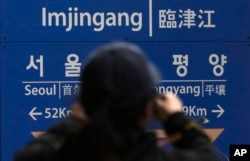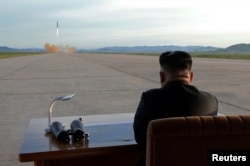The United States has granted a sanctions exemption requested by South Korea for a survey that could help reconnect railway links between North and South Korea. The sanctions were imposed by the U.N. Security Council.
The move comes as nuclear talks between Washington and Pyongyang hit a snag. A diplomatic source told VOA's Korean Service on Monday the exemption only applies to the survey mission, not the proposed rail-link project itself.
"There are sanctions, and if you want to do something, like delivering or selling products or goods that are subject to these sanctions, you need to go for an exemption of these sanctions," the source said.
The Security Council approved the exemptions Friday, allowing the two Koreas to jointly conduct a survey on reconnecting their railways. The Security Council placed extensive sanctions on North Korea over its nuclear weapons program in December 2017. The United States proposed the sanctions, which were adopted by a vote of 15 to 0.
Seoul and Pyongyang agreed earlier this year to modernize North Korea's railway system and connect it with South Korea's, but U.N. sanctions prohibit such interactions with North Korea.
Seoul's plan to conduct the survey with Pyongyang stalled in recent months over concerns that it might violate U.N. sanctions that restricted shipment of goods to North Korea.
The exemption for the survey, which Seoul requested, would allow South Korea to send trains, fuel, equipment and other goods associated with the survey across the border to determine the condition of the North Korean railway system.
The move by the U.N., which the U.S. agreed to as the permanent member of the Security Council, comes amid a stalemate over denuclearization talks between Washington and Pyongyang.
'Incentivize' North Korea
Negotiations over denuclearization hit an impasse when North Korea abruptly called off a meeting planned with Secretary of State Mike Pompeo at the last minute early this month.
Experts said the U.S. agreed to grant the rail survey exemption to encourage North Korea to denuclearize.
"It is designed to incentivize North Korea to take concrete steps on denuclearization," said Robert Manning, a senior fellow at the Atlantic Council. "It suggests the U.S. is looking for low-cost ways to get progress on dismantling North Korean nuclear weapons."
Gary Samore, the White House coordinator for arms control and weapons of mass destruction during the Obama administration, said, "The U.N. decision reflects an effort by Washington and Seoul to entice North Korea with promises of future economic benefits if it agrees to take steps to denuclearize."
Douglas Paal, vice president for studies at the Carnegie Endowment for International Peace, said the exemption suggests Washington's approval of Seoul's stance on offering incentives to the North to move toward denuclearization.
"It is a nod by the U.S. to Seoul's argument that the North needs to be given something for its gesture so far toward a reduction of tensions," Paal said.
Scott Snyder, director of the Program on U.S. Korea Policy at the Council on Foreign Relations, said the move shows that "the U.S. is pragmatically maintaining sanctions while also demonstrating flexibility where necessary or desirable."
Manning, however, doubts whether the rail survey exemption would be a sufficient incentive toward denuclearization.
"A more productive approach is to offer a larger package of benefits but only as a part of action-for-action negotiations," Manning said.
'Close coordination'
Ken Gause, director of the International Affairs Group, believes granting a sanctions exemption will help keep "Pyongyang invested in the engagement process."
Gause said "by allowing some sanctions relief, we can begin to gauge how serious North Korea is to make positive movement on its nuclear program."
Despite apparent flexibility on sanctions, the U.S. remains guarded.
"The United States and (South) Korea are committed to close coordination on our unified response to North Korea," a State Department official said in an email message sent to VOA's Korean Service on Monday.
Seoul is waiting for Pyongyang's reply to its proposal for the joint railway survey while it is talking with the United Nations Command (UNC) to prepare for the survey, which is expected to take place later this week. The UNC oversees the activities in the border between the South and the North.
Ham Ji-ha and Baik Sung-won of VOA's Korean Service, contributed to this report.






